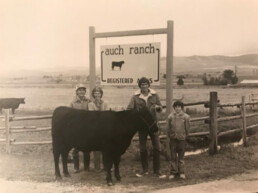There was never a dull moment at home with his mom Dolly and dad Ed. Mom worked right alongside the men. Many times outpacing them. Dad could usually be found fixing farm equipment, elbow deep in engine grease.
Running a small ranch required an “all hands on deck” approach to getting the work done.

And that’s still true today.
After his dad passed away in 2014, Dwight Auch’s mom told him—with unwavering conviction in her eyes—they had to make sure the ranch stayed in ranching hands. Over time, they’d seen a great deal of farmland rapidly convert to other uses. Yet it wasn’t so simple. How could they keep it in ranching, knowing that someday they might have to sell it, even if that meant generations from now?
Future Ranchers
“It was after a lot of thought and discussion that my mom and I decided that the right thing to do, for our family, was to conserve our ranch,” explains Dwight. “We felt we could honor our family, and make it possible for future ranchers to work the land, for years to come. It just made sense.”
Given their ranching heritage, the Auchs know, perhaps better than many of us, that with the uncertainty of agriculture markets, unforeseen family hardships, and the continual growth of communities, there will likely be pressure to develop farm and ranch land.
When Dwight reflects on why he wanted to conserve the land, he quietly says “I feel so fortunate to have grown up and been able to spend so much time outside on our small cattle ranch in Corvallis. Now, there’s a greater chance that others will be able to do that in the future; it gives us peace of mind.”
“As more working land is preserved in this magnificent valley. I hope that more young people who choose agriculture as a career will be able to do so.”
– Dwight Auch
More affordable access to land is part of the solution, and often conserved lands are more affordable than those competing for the estate or development market. The Auchs see that as a real benefit.
Other ranchers and farmers are coming to the same conclusion. Thanks to you, our members and supporters, we are now in conversations with a number of local families to help them figure out if conservation is right for them.
